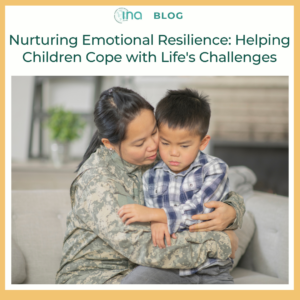 By Nora Gilbert
By Nora Gilbert
Life can be tough, even for children. From the daily stresses of school and extracurricular activities to bigger challenges like illness, loss, and family issues, children face a range of stressors that can impact their emotional well-being.
As parents and caregivers, it’s our job to help children develop the emotional resilience they need to cope with life’s challenges. In this article, we’ll explore what emotional resilience is, why it’s important, and how parents and caregivers can nurture it in children.
What is Emotional Resilience?
Emotional resilience refers to a person’s ability to adapt and cope with stress, adversity, and challenges in life. Resilience isn’t about avoiding difficult situations or feeling happy all the time, but rather about being able to bounce back from setbacks and maintain a positive outlook.
According to experts from TopAndStyle, emotional resilience is a key factor in overall mental health and well-being, and it’s a skill that can be developed and strengthened over time.
Why is Emotional Resilience Important?
Emotional resilience is important for several reasons:
- It helps children cope with stress and adversity.
- It promotes mental health and well-being.
- It supports positive relationships and social connections.
- It fosters a sense of purpose and meaning in life.
Strategies for Nurturing Emotional Resilience in Children
1) Teach Coping Strategies
Help children identify and develop healthy coping strategies for managing stress and adversity. Some examples include deep breathing exercises, mindfulness meditation, journaling, or talking to a trusted adult.
2) Encourage Positive Self-Talk
The way children talk to themselves can impact their emotions and their ability to cope with stress. Encourage positive self-talk by teaching children to focus on their strengths and to talk to themselves in a supportive and encouraging way.
3) Promote Social Connections
Children who feel connected to others and have a support system in place are more likely to be emotionally resilient. Encourage children to build positive relationships with family members, friends, and teachers. Make time for regular family activities and help children get involved in extracurricular activities that interest them.
4) Build Resilience Through Play
Play is an important way for children to learn and develop skills, including emotional resilience. Encourage children to engage in play that challenges them and helps them build skills like problem-solving and persistence.
5) Model Emotional Resilience
Children learn a lot from watching the adults in their lives. Model emotional resilience by staying positive, managing stress in healthy ways, and bouncing back from setbacks. Talk openly with your child about your own experiences with challenges and how you coped with them.
Some Statistics to Know
- A 2019 study found that emotional resilience in children is linked to better mental health outcomes in adulthood.
- According to the American Psychological Association, children who are emotionally resilient are better equipped to manage stress, form positive relationships, and achieve their goals.
Summing Up!
Nurturing emotional resilience in children is essential for their overall mental health and well-being. By teaching coping strategies, promoting positive self-talk, building social connections, encouraging play, and modeling emotional resilience, parents and caregivers can help children develop the skills they need to cope with life’s challenges.
Remember, building emotional resilience takes time and effort, but with patience, consistency, and support, children can develop the skills they need to thrive in life.
Meet Nora Gilbert, a gifted wordsmith and Content Head at TopAndStyle, a lifestyle blog that’s all about living your best life. With her creative flair and impeccable attention to detail, Nora crafts compelling articles that inspire readers to embrace their passions, explore new experiences, and cultivate a positive mindset.
